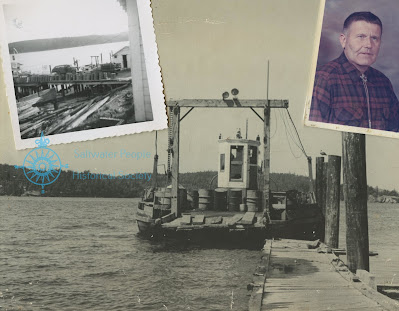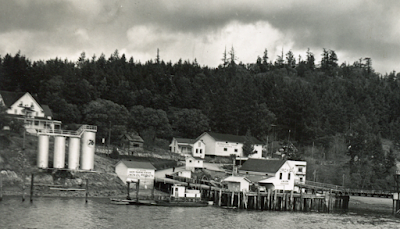 |
Seattle waterfront postcard by Ellis.
|
"
Early in the summer of 1929, this boy of 16 got his first chance to explore Seattle’s fascinating waterfront on his own. My family had moved from Everett in the previous fall. My walk usually took me along the route of the Kinnear streetcar line. A pleasant pause was always made at Kinnear Park, from where the activities at Smith Cove could be checked. One of the “President Liners” and/or a Japanese steamship of the N.Y.K. Line was usually in port from the Orient.
The plank sidewalk of Railroad Avenue was joined at Bay Street to check out any vessels at the Union Oil Dock. Then came the many finger piers with ships working cargo. The most exciting area was around the Colman and Grand Trunk Docks, with the comings and goings of the ferries and the steamers of the “Mosquito Fleet.” The schedules were quickly learned so as to be at the right places for sailings and arrivals of interest.
One unforgettable hour was spent on Pier 7, Schwabacher Dock, when the old wooden motorship Zapora was to sail for the west coast of Prince of Wales Island in Alaska. The passengers were already aboard, but the departure was delayed because of the non-arrival of the supply of potatoes. By the time the dray showed up, all of the space was filled and the stowage of even a dozen sacks of spuds became a problem. The mate settled the confusion by taking the canvas covers off the two lifeboats and then had six sacks put in each boat. With the problem solved, the little Zapora chugged off to the North, but an hour late. On Friday, the fifth of July, when at my aunt’s desk, I heard a booming voice with a cockney accent behind me and was then introduced to Billy Snow. He was a short man with tobacco-stained teeth and had a motorist’s cap on his head. As the waterfront driver for the laundry, he was in the office to pick up his papers for delivery of clean linens to a Matson Lines freighter at the Union Pacific Dock. I quickly accepted the invitation to go along for the ride. His truck was a Dodge Brothers, with wood-spoked wheels and an enlarged body for a big carrying capacity.
Our load was for Makiki, a standard-type WW I freighter. On arrival, Mr. Snow went aboard to get help loading. The steward and a messman accompanied him back down the gangway. I noted right away that the driver was respectfully addressed as “Captain Snow.” Wanting to get aboard, I helped carry the bundles to the linen room. When the job was done, we were invited into the saloon for cold drinks. Right then and there I knew I wanted to ship out sometime.
On the way back I learned that Model Electric handled the laundry for the steamships of the Alaska Line, Matson’s freighters, three tankers of the General Petroleum Co., and the ferry steamer City of Victoria, which was running out of Edmonds. Scheduled deliveries were made both to Pier 2, for Alaska Steamship vessels, and to Edmonds, but the Matson freighters and tankers were handled whenever they were in port. I was invited to come along whenever I was downtown and got no objections from home as Captain Snow lived close to us.
The trips to Pier 2 were fun, as the stewards made a place for me in the “coolie” line that carried the laundry bundles aboard. I could get looks at the outside decks, alleyways, and linen rooms on all of the passenger steamships except Northwestern and Yukon. They had small side ports on the saloon deck and the bundles were just dumped in the doorway.
My biggest surprise came on boarding the General Petroleum tankers at Harbor Island. I had imagined that the vessels would be dirty as well as smelly, but I found Lebec to be quite the opposite. Her messrooms were attractively painted, a contrast to the starkly plain Matson freighters. All was spotlessly clean aboard.
It wasn’t long before I was on hand at 4 p.m. to make the trip out to Edmonds to meet the City of Victoria. How grand the stately old ferry steamer looked as she came across from Possession Point to make her starboard landing. I couldn't wait to carry some bundles aboard, through the auto deck side port to the linen room. Then I scurried off and toured the vessel. How beautiful, I thought, were her Victorian decorations and furnishings. The fore and aft lounges with their grand stairways and open upper deck galleries impressed me the most. However, there was a faint musty odor throughout the ferry. By the time the hurried tour was over and I had returned to the truck, the laundry had all been loaded. Captain Snow just winked and had me ride in the back with the dirty linens, as several officers were in the front seat hitching a ride.
After a trip or two to Edmonds, I asked the Captain if he could get me a berth on the City of Victoria. His answer was yes, but he preferred I wait until the next summer when I would be 17. So I spent the rest of the vacation as an unpaid swamper on the laundry truck. However, it was a wonderful chance to visit various steamships and to learn something about our very interesting waterfront.
Lloyd Statum. The Sea Chest journal. Puget Sound Maritime. Seattle. Sept. 1983,







.png)



